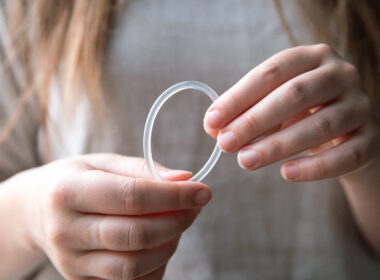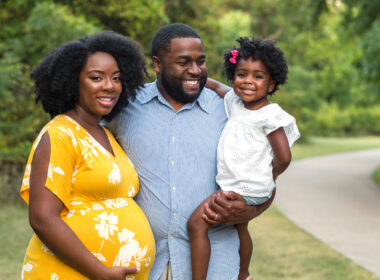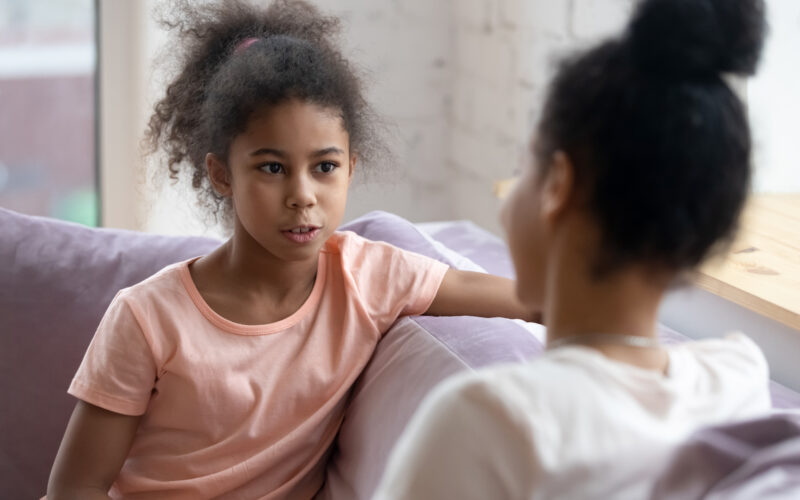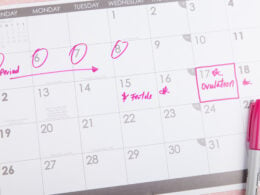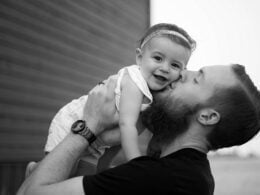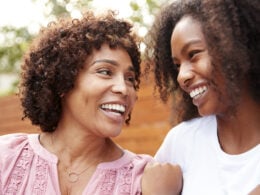“Can I ask you something weird?”
“Sure…”
“Have you had a period yet?”
“Nope. Not yet.”
“Me neither!”
This was the start of a conversation I had with my friend Shannon during the summer we both turned 14. The little brochures we had received at school said that most girls started their periods between the ages of 11 and 14, so we weren’t sure what to think about Aunt Flo’s no-show. However, whether by wild coincidence or some internal awareness of plunging progesterone levels prompting this conversation, we both had our first period the next day. And although our bodies had clearly started preparing for this momentous event a couple of weeks (and really, years) prior, for a long time I associated our dual menarches with Shannon being able to break the taboo around periods to talk about women’s health with a friend.
In fact, I have gained a lot over the years from conversations with friends about periods and fertility. And while I think peer-to-peer sharing of this kind of knowledge is an incredible gift (and it’s actually the premise behind Natural Womanhood’s Cycle Mindfulness Clubs on select college campuses!), I wish that I’d felt more comfortable discussing these topics with my mom, even before my period began.
So today, I’m sharing the most impactful fertility- and menstrual-cycle related conversations I’ve had with my peers over the course of my life. I hope my sharing will show moms that girls at every age are hungry for this information, leading them to have conversations with their own daughters about periods!
Period pain or appendicitis?
“I heard somewhere that the trick is to sit on the kitchen counter and then hop off. If it’s just a period, it will hurt the same amount as before, but if it’s appendicitis it will be excruciating. But at least then you know what’s happening.”
Some of you might be wondering why anyone would need this handy tip, but this was part of a conversation where my friend, Brittany, was sharing the story of a memorable Saturday in her early teens where she woke up to severe abdominal pain, nausea… and vaginal bleeding. The pain was quite a bit worse than her first couple of periods, but she figured that her period symptoms had simply hit their full stride now that the first few cycles were behind her. Not one to let a period ruin a good day, she spent the morning at the mall with some friends, but by the time she got home, she was ready to ask her mom for help.
“Dad, do you know where Mom is?” she asked.
“She’s out running errands; can I help you with anything?”
“Umm, no… it was more of a girl question. I’ll just ask when she gets back.”
Her dad went to check on her a little while later only to find her in terrible pain, and he insisted on taking her to the ER. There the doctor told her that, thank God, such symptoms were no just a normal part of being a woman, and she was lucky that she didn’t wait at home any longer or her appendix would have burst.
Period pain should never be debilitating
The funny thing is, hearing my friend’s appendicitis story todavía didn’t clue me in to the fact that severe menstrual pain is not normal. I myself had experienced shaking, intense pain and vomiting as a teen during a period and probably wouldn’t have noticed if my appendix was ready to blow. I don’t think my mom would have either as she always assured me that she experienced the same thing as a young adult. What I know now is that it’s VERY important to teach teens about the range of symptoms they can expect during a period and what sort of symptoms require medical attention.
“I mean, sometimes there’s a little bit of an uncomfortable feeling the first day, but it doesn’t really impact my life."
Would you believe that I found this conversation in college more shocking than my friend’s appendicitis story? This was the first time I had heard someone say that crippling dysmenorrhea was not her standard period experience. My mom’s menstrual experience was similar to mine (which makes sense–genetics!), but even my close friends in high school did not mention anything different–but I also never thought to ask.
What this conversation taught me: I didn’t know that a non-debilitating period was a possibility until college, but after hearing that period pain could (and should) be mild from my college friend, I started asking about other people’s experiences.
We both had period pain, but different causes
Through increased openness to these kinds of conversations, I found that my symptoms were quite different from the experience of another friend with painful periods, and she was later diagnosed with endometriosis. (I suspect that my painful cramping had more to do with my prostaglandin levels, a compound important in the inflammatory response.)
Endometriosis, as in my friend’s case, often involves painful periods, but can also involve pelvic pain outside of menstruation. For my periods, the pain was directly proportional to the duration of the period: lower pain was associated with longer periods, and higher levels of pain was associated with much shorter periods (including a notable occasion in college with a 45 minute period and muy intense pain).
What this conversation taught me: Not every painful period has the same origin. This distinction was helpful because different root causes may need different types of treatment to manage or eradicate symptoms.
Syncing your life with your menstrual cycle
“Always save strength-building exercises for the follicular phase.”
One of my friends in college who had a passion for fertility awareness would always reserve the first part of her cycle for higher intensity workouts. After peak day, she would switch to lower intensity workouts with the knowledge that, after ovulation, the body is preparing for a possible pregnancy and theoretically may be prioritizing energy conservation over muscle building. It’s true that there is scant research on how menstrual cycle phases impact strength training performance (not to mention the fact that the research that does exist is poorly-designed, due to an assumption of 28 day cycles rather than having women actually track their cycles to identify which phase they were in). But at the very least, as Megan at The Aligned Cycle emphasizes, individual women can track their cycles and symptoms during each phase to tailor their exercise plan to what works well for them personally.
My friend wanted her habits around nutrition and exercise to be as efficient as possible by working con her body, taking into consideration the role her hormones play in different aspects of her whole-body health. (We previously discussed cycle syncing at length aquí.)
What this conversation taught me: This was eye-opening to me because it made so much sense and completely defied the idea that menstrual cycles are some sort of problem or liability instead of an important part of how the body as a whole functions.
Moms need to know what’s normal- and what’s not- before talking to their daughters about periods (and Natural Womanhood can help!)
Talking about periods with peers can be difficult or awkward, so many teens naturally turn to their moms as their go-to expert on women’s health. While this is a great place to start, issues with fertility tend to run in families, so questions about whether really long cycles, intense pain, heavy bleeding, or PMS are “normal” might be met with, “I think so, that’s how things always were for me, too!” That’s why it’s essential that moms themselves become better educated about what is normal–and what isn’t–about menstrual cycles, especially preteen and teen cycles that are just beginning and still regulating! Fortunately, Natural Womanhood is currently developing a Moms of (Pre)Teens program that gives mothers the tools to start having easy, natural conversations about cycles and fertility with their daughters (more on this, below) at an early age.
Girls need their moms to talk about periods
In fact, if more moms facilitated openness around these discussions with their daughters earlier on, more girls would gain the confidence to branch out and have open conversations with their friends about menstrual cycles, in turn leading to different perspectives, new insights, advice shared, and camaraderie. As with anything else, practice makes perfect–if talking about periods or fertility with someone feels awkward the first time, it’ll probably feel less awkward with each conversation… and who knows what you might learn?
Nothing takes the place of a mom talking openly to her daughter about periods
Teens nowadays are fortunate to have multiple resources and options for learning about their cycles y, thanks to healthcare providers trained in restorative reproductive medicine, for addressing root causes of cycle issues they might experience. Learning through a program tailored specifically to teens o tweens and talking with friends are among them, along with utilizing an educational app (NW-recommended apps are aquí!). These are all ways for teens and young women to learn more about their bodies–but none can come close to the gift of moms communicating openly with their daughters about these things. And the more young women learn about their bodies, the more they will come to value the gift of their fertility, not just for reproduction, but for whole-body health.
Learn more about Natural Womanhood’s forthcoming Moms of (Pre)Teens Program
Are you a mom concerned about your daughter’s education concerning periods and her budding fertility? Do you want her to be prepared for puberty and for facing the challenges that come with the experience of a new menstrual cycle?
If so, we’d like to invite you to preregister today (commitment-free!) for Natural Womanhood’s Moms of (Pre)Teens Program. To find out more about this forthcoming program, pulse aquí.
Lecturas complementarias:
NW Book Review: La guía de la chica feliz para ser completa
Signs that your daughter will be getting her first period soon- and how to prepare her for it
Teens and irregular periods: What’s normal- and what’s not (Part I)
Teens and irregular periods: What’s normal- and what’s not (Part II)


